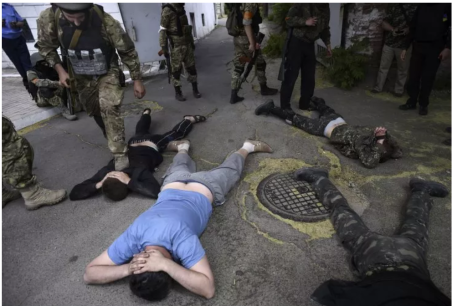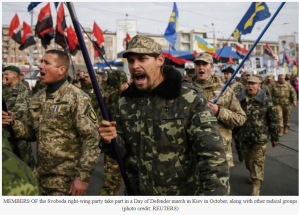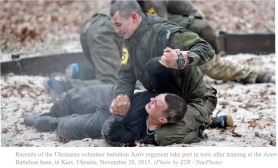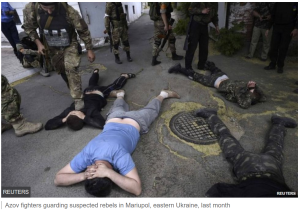.
US taxpayers are forced to fund terrorist Azov battalion. In 2015 congress banned funding Azov, but the Pentagon intervened and cancelled the ban.…“Ukrainian President Petro Poroshenko announced today [9/13/2014] that the majority of Russian troops had left the country.”.
9/10/2014, “Ukrainian Nationalist Volunteers Committing ‘ISIS-Style’ War Crimes,” Newsweek, Damien Sharkov
 “Ukrainian servicemen from the Azov battalion detain men at a site of battle with pro-Russian separatists in the eastern Ukrainian port city of Mariupol June 13, 2014. Osman Karimov/Pool/Reuters”
“Ukrainian servicemen from the Azov battalion detain men at a site of battle with pro-Russian separatists in the eastern Ukrainian port city of Mariupol June 13, 2014. Osman Karimov/Pool/Reuters”
to a report from Amnesty International, as
evidence emerged in local media
Armed volunteers who refer to themselves as the Aidar battalion
“have been involved in widespread abuses, including
abductions, unlawful detention, ill-treatment, theft, extortion, and possible executions”,
Amnesty said.
The organisation has also published a report detailing similar alleged atrocities committed by pro-Russian militants, highlighting the brutality of the conflict…
Amnesty’s statement came before images of what
appeared to be the severed heads of two civilians’
started circulating on social media today, identified by Russian news channel NTV as the heads of rebel hostages.
Shortly after, Kiev-based news network Pravilnoe TV reported that
it had spoken with one of the mothers of the [Eastern Ukraine] victims who confirmed
her son was a rebel, captured during fighting in Donetsk.
her son’s head in a wooden box
in the post, blaming nationalist volunteers [eg, Azov, Aidar] for her son’s death.
Newsweek has not been able to verify the report independently.
There are over 30 pro-nationalist, volunteer battalions similar to Aidar, such as Ukraina, DND Metinvest and Kiev 1,
all funded by private investors.
The Aidar battalion is publicly
backed by Ukrainian oligarch Ihor Kolomoyskyi,
who also allegedly funds the Azov, Donbas, Dnepr 1, Dnepr 2 volunteer battalions,
operating under orders from Kiev.
Last spring [2014] Kolomoyskyi offered a bounty of $10,000 of his own money
for each captured Russian “saboteur”.
[“This is not the first time Kolomoisky has put his own money toward the country’s defence. Last month [March 2014], the oligarch spent “several million dollars” buying car batteries for military vehicles. Ukraine’s army has suffered years of neglect, with a reported 6,000 battle-ready troops at the moment.”]
A warrant for Kolomoyskyi’s arrest was issued in Russia in July
for “organising the killing of civilians,“ through his sponsorship of volunteer militants.
“According to the government these volunteers always operate under an overall command and control of one of their regular forces,” Denis Krivosheev of Amnesty International told Newsweek.
Amnesty’s report, however, indicates
Kiev’s loose regulation on volunteer groups and its “members…
act with virtually no oversight or control”.
Amnesty has asked for Kiev to clarify the legal status and affiliation of its volunteer battalions and fully integrate them into “clear chains of command”, making all of its servicemen aware of international law and implementing “effective investigations” into abuses of human rights.
Meanwhile Norwegian channel TV2 presented footage yesterday [2014] of the
Azov battalion flying flags with the symbols
of Ukraine’s neo-Nazi party – Patriot of Ukraine.
This is [allegedly] the first instance of government-backed volunteers displaying far-right tendencies. However, numerous powerful paramilitary groups are reportedly involved in the Ukrainian conflict such as
Ukrainian President Petro Poroshenko announced today that
the majority of Russian troops had left the country,
raising hopes of peace negotiations between Kiev and pro-Russian separatists.”
*****************************
Added: US taxpayers are forced to fund Azov battalion. In 2015 congress placed a ban on funding Azov, but the Pentagon intervened and cancelled the ban:
1/14/2016, “Congress Has Removed a Ban on Funding Neo-Nazis From Its Year-End Spending Bill," James Carden, The Nation
 [Image: Oct. 2015, Members of the Svoboda right-wing party take part in a Day of Defender march in Kiev in October, [2015] along with other radical groups, Reuters]
[Image: Oct. 2015, Members of the Svoboda right-wing party take part in a Day of Defender march in Kiev in October, [2015] along with other radical groups, Reuters]
“Under pressure from the Pentagon, Congress has stripped the spending bill of an amendment that prevented funds from falling into the hands of Ukrainian neo-fascist groups.”
“In mid-December 2015, Congress passed a 2,000-plus-page omnibus spending bill for fiscal year 2016. Both parties were quick to declare victory after the passage of the $1.8 trillion package. White House spokesman Josh Earnest told reporters “we feel good about the outcome, primarily because we got a compromise budget agreement that fought off a wide variety of ideological riders.” The office of House Speaker Paul J. Ryan touted the bill’s “64 billion for overseas contingency operations” for, among other things, assisting ”European countries facing Russian aggression.”
It would be safe to assume that one of the European countries which would stand to benefit from the omnibus measure—designed, in part, to combat [alleged] “Russian aggression”—would be Ukraine, which has already, according to the White House, received $2 billion in loan guarantees and nearly $760 million in “security, programmatic, and technical assistance” since February 2014.
 [Image: 10/14/2014, “Fighters from the Azov volunteer battalion ignite flares during the march marking the 72th anniversary of the Ukrainian Insurgent Army in Kiev, Ukraine, Tuesday, Oct. 14, 2014. The Ukrainian Insurgent Army initially collaborated with the Nazis, believing Hitler would grant Ukraine independence, but then went on to fight both Nazi forces and the Red Army. Photo by Sergei Chuzavkov /AP” Ottawa Citizen]
[Image: 10/14/2014, “Fighters from the Azov volunteer battalion ignite flares during the march marking the 72th anniversary of the Ukrainian Insurgent Army in Kiev, Ukraine, Tuesday, Oct. 14, 2014. The Ukrainian Insurgent Army initially collaborated with the Nazis, believing Hitler would grant Ukraine independence, but then went on to fight both Nazi forces and the Red Army. Photo by Sergei Chuzavkov /AP” Ottawa Citizen]
Yet some have expressed concern that some of this aid has made its way into the hands of neo-Nazi groups, such as the Azov Battalion. Last summer [2015] the Daily Beast published an interview by the journalists Will Cathcart and Joseph Epstein in which a member of the Azov battalion spoke about “his battalion’s experience with U.S. trainers and U.S. volunteers quite fondly, even mentioning U.S. volunteers engineers and medics that are still currently assisting them.”
[7/16/2014, BBC: “The key figures in the Azov Battalion are its commander, Andriy Biletsky, and his deputy, Ihor Mosiychuk. Andriy Biletsky is also the leader of a Ukrainian organisation called the Social National Assembly. Its aims are stated in one of their online publications: *”to prepare Ukraine for further expansion and to struggle
for the liberation of the entire White Race
from the domination of the internationalist speculative capital” *“to punish severely sexual perversions and any interracial contacts that lead to the extinction of the white man.” This, according to experts, is a typical neo-Nazi narrative.“]
“Azov fighters guarding suspected rebels in Mariupol, eastern Ukraine, last month [June 2014],” reuters
And so, in July of last year [2015], Congressmen John Conyers of Michigan and Ted Yoho of Florida drew up an amendment to the House Defense Appropriations bill (HR 2685) that “limits arms, training, and other assistance to the neo-Nazi Ukrainian militia, the Azov Battalion.”
It passed by a unanimous vote in the House.
And yet by the time November [2015] came around and the conference debate over the year-end appropriations bill was underway, the Conyers-Yoho measure appeared to be in jeopardy. And indeed it was. An official familiar with the debate told The Nation that the House Defense Appropriations Committee came
under pressure from the Pentagon
to remove the Conyers-Yoho amendment from the text of the bill.
The Pentagon’s objection to the Conyers-Yoho amendment rests on the [alleged] claim that it is redundant because similar legislation—known as the Leahy law—already exists that would prevent the funding of Azov. This, as it turns out, is untrue. The Leahy law covers only those groups for which the “Secretary of State has credible information that such unit has committed a gross violation of human rights.”
Yet the State Department has never claimed to have such information about Azov, so funding to the group cannot be blocked by the Leahy law. The congressional source I spoke to pointed out that “even if Azov is already covered by Leahy, then no there was no need to strip it out of final bill.” Indeed, the Leahy law cannot block funding to groups, no matter how noxious their ideology, in the absence of “credible information” that they have committed human-rights violations. The Conyers-Yoho amendment was designed to remedy that shortcoming.
 (“Recruits of the Ukrainian volunteer battalion Azov regiment take part in tests after training at the Azov Battalion base, in Kiev, Ukraine, November 28, 2015). (Photo by STR / NurPhoto)
(“Recruits of the Ukrainian volunteer battalion Azov regiment take part in tests after training at the Azov Battalion base, in Kiev, Ukraine, November 28, 2015). (Photo by STR / NurPhoto)
Considering the fact that the US Army has been training Ukrainian armed forces and national guard troops, the Conyers-Yoho amendment made a great deal of sense; blocking the avowedly neo-Nazi Azov battalion from receiving US assistance would further what President Obama
often refers to as
“our interests and values.”
That neo-Nazis (or neo-fascists, if you prefer) are a distinctly minority taste in Western Ukraine, is clear and is not in dispute. Of late, however, there have been troubling signs that they may become a force to be reckoned with. According to The Jerusalem Post, in Ukrainian municipal elections held last October [2015],
the neo-Nazi Svoboda party won 10 percent of the vote in Kiev and placed second in Lviv.
The Svoboda party’s candidate
actually won the mayoral election in the city of Konotop.
Meanwhile, Radio Free Europe/Radio Liberty reported in November
that Azov operates a boot camp that exposes children to “the regiment’s far right-wing ideology.”
Whether White House spokesman Josh Earnest was referring, in part, to the Conyers-Yoho amendment as one of those “ideological riders” the administration fought to defeat is unclear. What is clear is that by stripping out the anti-neo-Nazi provision, Congress and the [Obama] administration have
paved the way for US funding to end up in the hands of the most noxious elements circulating within Ukraine today.”
“James W. Carden is a contributing writer for foreign affairs at The Nation. He served as a policy adviser to the Special Representative for Intergovernmental Affairs and the Office of Russia Affairs at the US State Department.”


No comments:
Post a Comment